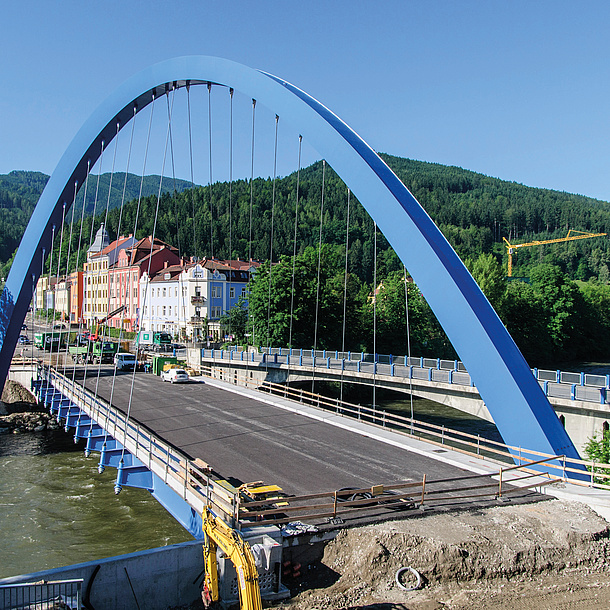- Duration of study: 4 semesters
- ECTS credit points: 120
- Academic degree: “Diplom-Ingenieurin” or “Diplom-Ingenieur” ("Dipl.Ing." or "DI"), equivalent to the Master of Science (MSc)
- Language of instruction: German
The Master's Programme
All concrete is unique. One thematic focus of the degree programme is placed on designing and building structures with Ultra-High Performance Concrete (UHPC). This material is characterized particularly by its high density and strength, which makes it possible to create innovative constructions on a large scale. In this programme, you will learn how to design with and use UHPC in construction projects. In currently running projects, research is also carried out on other innovative high-performance concretes, such as carbon concrete, or novel processes such as 3D concrete printing.A second thematic focus is placed on studying the behaviour of reinforced concrete. In this programme, you learn how to record and calculate the load-bearing behaviour of this material with high levels of mechanical consistency. You will also learn how to conduct holistic structural analyses with the finite element method (FEM), using modern FEM programmes and design tools for this purpose such as SOFiSTiK and INCA. These tools provide you with a basis that enables you to conduct structural analyses in the future with 3D overall models.
In three compulsory and three elective modules, you gain qualifications and competences that enable you to calculate, constructively design and operationally maintain building and bridge structures as well as related structural facilities. From the 3rd semester and on, courses are offered in the Laboratory for Structural Engineering. The nearby Building Technology Centre ("Bautechnikzentrum, BTZ") with its laboratories for testing materials, components and constructions also provides a practical location for university teaching based on state-of-the-art research. In the 3rd semester, you will complete a master's project and, in the 4th semester, you will write your master's thesis. The content of this thesis can be assigned to one of the compulsory or elective modules.
Play video
Students talk about the Master's programmes in Civil Engineering
In currently running research projects, practical design methods are being developed to capture the realistic constraint loads of reinforced concrete components. Another research topic is design models that allow you to create jointless concrete structures in building and bridge construction or, for example, in locks for shipping lanes. These models are already being used in international construction projects.
An increasingly important thematic focus is placed on interdisciplinary research on sustainable construction methods, including digital methods and application-oriented materials research. The Robot Design Laboratory, which is run jointly with the Faculty of Architecture, enables innovative uses for new technologies and materials to be tested. The Concrete Student Trophy is awarded annually to innovative interdisciplinary student projects that combine achievements in architecture and structural engineering.
In the first two semesters, you will deepen your knowledge of the engineering sciences in three compulsory modules:
- Design in concrete, timber, steel and composite construction: Among other things, you will learn how to model, design and optimize complex structures using different materials and to record their load-bearing and stiffness behaviour.
- In-depth and numerical mechanics: You will learn how to use static and dynamic models for shell structures and three-dimensional continua to assess structural stability. Finite element methods (FEM) play a central role here.
- Materials and building construction planning: Among other things, you will learn how to choose and use the best materials for load-bearing components with respect to the building physics, how to optimally integrate technical building systems and how to apply experiment-based methods where necessary.
In this degree programme, you have the opportunity to choose individual key areas in three out of six elective modules. You can choose from among the following modules:
- Simulation and Mechanics: This module provides you with skills that enable you to depict building designs in physically accurate models and to define suitable structural models that also consider complex effects.
- Civil engineering: One focus is directed toward bridge design and construction and the use of Ultra-High Performance Concrete (UHPC).
- Building construction: This module covers aspects that range from façade and glass construction to building technology, on to lightweight construction and masonry construction, and even extends to sound insulation and acoustics.
- Planning, construction and detailed dimensioning: You will learn among other things how to convert designs into buildable load-bearing structures and select the correct materials for these structures. In the process, you can learn more about Building Information Modelling (BIM).
- Structural monitoring and maintenance: In this module, you will learn how to identify structural damage and initiate state-of-the-art remediation processes.
- Materials and sustainability: This module emphasizes the life cycle management of both construction products and projects.
Admission
Graduates of the Bachelor's Degree Programme in Civil Engineering Sciences and Construction Management at TU Graz are admitted without needing to fulfil further requirements.
Graduates of other Austrian universities can apply for admission.
Graduates of other foreign universities can obtain information and apply for admission by contacting study@tugraz.at.
- Admission and deadlines for Austrian students who are beginning their studies at TU Graz for the first time
- Admission and deadlines for international students
- If you are or were already admitted to a degree programme at TU Graz, please come to the TU Graz Registrar’s Office in person during the admission period or contact study@tugraz.at.
Contact study@tugraz.at
Career Prospects
The diversity of this subject area and the rapid technological development taking place in the various disciplines in the field require graduates to have a high level of technical knowledge and strong social and economic skills. As a civil engineer, you will have a solid, interdisciplinary and critical understanding of the current state of knowledge. Typical employers in the sector include:
- engineering offices,
- construction companies,
- public authorities,
- industrial companies (especially building product manufacturers) and
- construction consulting firms.
Other common employers include institutions and companies that design, build and maintain infrastructure, such as:
- companies in the energy industry,
- telecommunications companies,
- railway operators,
- insurance companies and
- institutions that provide development aid.
In addition, graduates can pursue a career in research and teaching.
Acquire AI skills: AIE Extension Programme
Increase your career prospects with the Artificial Intelligence Engineering (AIE) extension programme and learn essential skills in AI development and application during or after completing your Master's degree.




